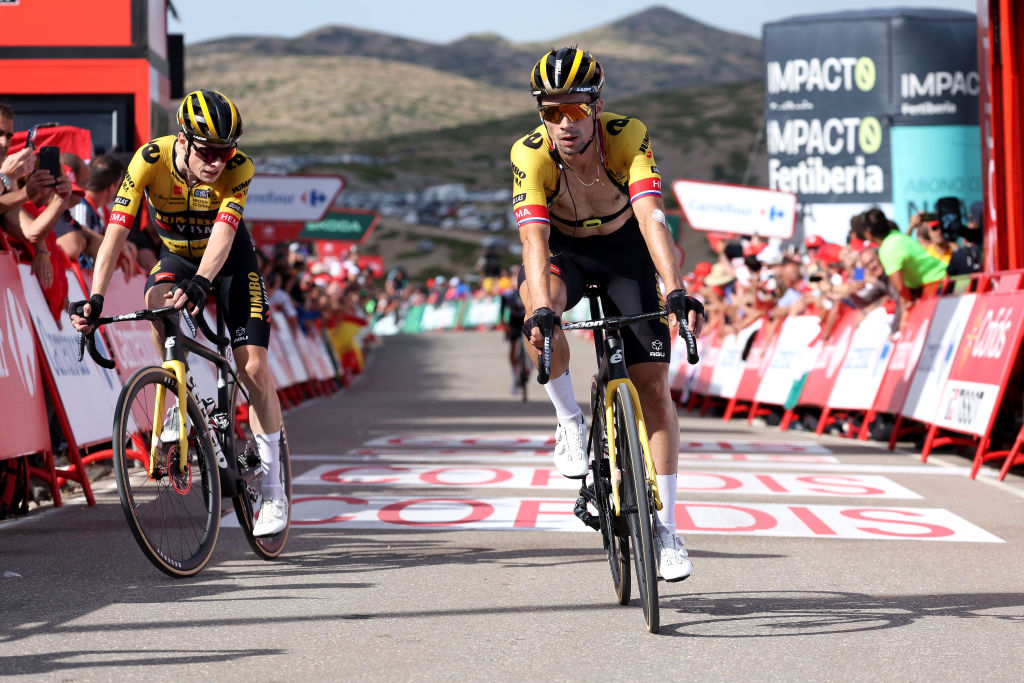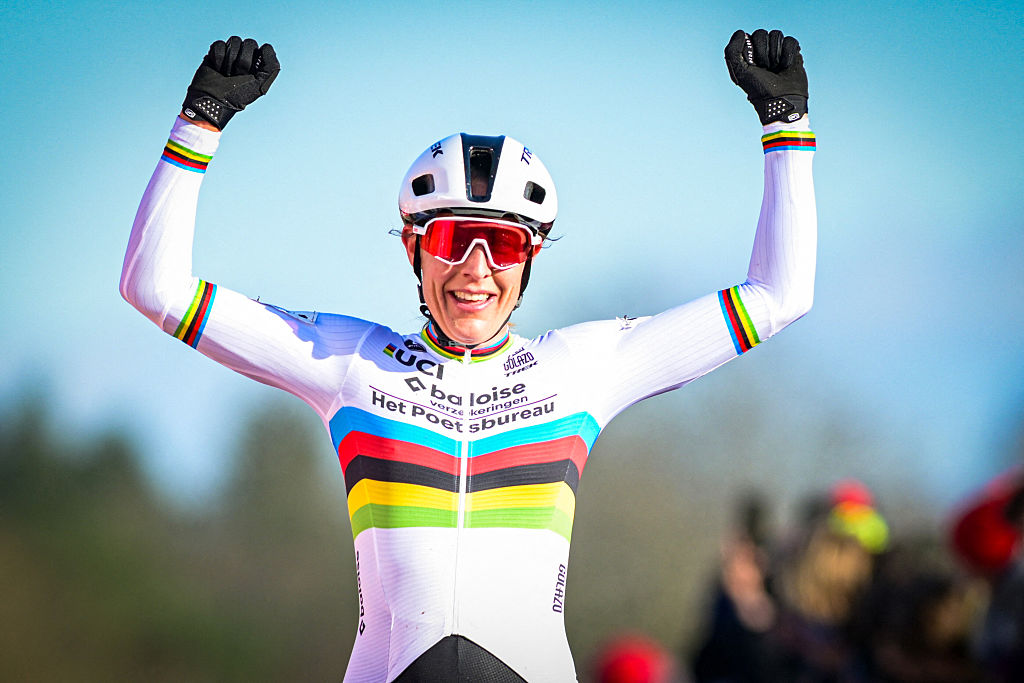Philippa York analysis: Vuelta momentum shifts from Evenepoel to Jumbo-Visma
Six days in, the race starts making sense - but nothing is settled yet

The latest race content, interviews, features, reviews and expert buying guides, direct to your inbox!
You are now subscribed
Your newsletter sign-up was successful
Finally, it’s all starting to make sense and even though it’s taken six days for the real Vuelta a España to show itself, the wait has been worth it. The gimmickry of the opening stages in Barcelona will gradually fade from memory, but like everyone who followed those first two days I was wondering why on so many levels.
I struggle to understand why the Spanish national tour has the least confidence in itself compared to the other Grand Tours. The racing it generates is every bit as exciting, but an evening team time trial in a city was always going to be a bit of an obstacle course rather than a display of power and harmony. You can’t predict it will rain and turn into a farce, but given how slippery those surfaces are in the dry, then a modicum of thought for safety would not have gone amiss.
Same again for the Montjuïc circuit the following day. The Olympic Park has a number of choices of road and given the size and freshness of the peloton on the first road stage, opting for another assault course of twists, turns and dodgy downhills seemed like a questionable bit of planning.
With the amount of skin lost and nerves frayed, it was no surprise that a truce of sorts was called, though the usual suspects, Primož Roglič and Geraint Thomas, still managed to be involved in crash beforehand. I always say you can expect to fall off at least once in a Grand Tour, so hopefully that’s it for them.
I know it’s not fair to DSM-Firminech or Andreas Kron to ignore the first two stages, but as the Vuelta heads towards its second weekend, we’re starting to get an idea of who is ready to race and who isn’t. Defending champion Remco Evenepoel certainly is, and outsprinting everyone on the first of the seven mountain top finishes was a warning to his rivals because he appeared so comfortable on the Arinsal climb.
The fact that UAE Team Emirates made most of the pace making to reduce the lead group to 15 riders or so was notable, as was the reluctance of Jumbo Visma to challenge that situation. It certainly wasn’t what was expected given the Dutch squad had been the biggest losers in the Barcelona fiascos.
After that, it was the Kaden Groves and Alpecin-Deceuninck sprint-fest for two days, though Filippo Ganna pushed him close into Burriana on stage 5. For the moment there doesn’t look to be many contenders for the green jersey competition but it’s still early days and a lot of climbing to be done. That usually complicates things for the fast men.
The latest race content, interviews, features, reviews and expert buying guides, direct to your inbox!
The Kuss factor
Talking of complications, of course, the sort-out on the run from La Vall d’Uxió to Javalambre on stage 6 has added to the problem of how the other teams can possibly go about defeating the race favourites at Jumbo-Visma. First there were two, in Roglič and Jonas Vingegaard. Now Sepp Kuss has been added to the equation. By putting Soudal-Quickstep under the cosh from the very start of Thursday’s stage, Jumbo have managed to place the American back in the overall fight and expose Evenepoel’s relative weakness on the steepest slopes.
Of course, Remco was saying all along that he wanted to lose the red jersey and its obligations for a few days, but I’m not sure he planned on being dropped by his biggest rivals in the process. Now they are all back to what is basically a level playing field with just a handful of seconds separating the main GC favourites, but the momentum has switched from Evenepoel to Roglič and company, which is quite significant as they head towards the next mountaintop finish on Sunday and, more crucially, the time trial after the first rest day.
Evenepoel, as world time trial champion, looks likely to take back valuable time there, so Jumbo-Visma have to take advantage of their greater numbers over the next couple of days.
Lenny Martinez’s time in the race lead is a big thing for the young French climber and Groupama-FDJ but I doubt he’ll be too much of a worry in the eyes of those who are thinking of the podium places in Madrid. Like Enric Was and Mikel Landa, that individual time trial is likely to see to heap of time lost to those who excel in the discipline.
It remains to be seen if Sepp Kuss will be a factor in the GC after that time trial, and we shouldn’t discount the UAE Team Emirates duo of Juan Ayuso and João Almeida, or for that matter Can Uidjebroeks and his Bora-Hansgrohe team leader Aleksandr Vlasov. None of them are out of the overall battle just yet even if they aren’t the ones making the decisions at the moment.
I think it’s fair to say that isn’t the case over at Ineos Grenadiers. Their hopes rested on Geraint Thomas, with Thymen Arensman as a back-up plan, but neither look to be at their best and they’re being dictated to by others rather than being part of the big decisions.
But thankfully, nothing is settled in the GC race just yet. Beyond the potential internal drama on the Jumbo-Visma bus over who is their team leader (answer: the road will decide), another thing I’ve noticed is the potential for Remco Evenepoel to be the next patron of the men’s professional peloton. At the moment, he’s not quite there, but you can see it developing. He has the profile, the confidence and the intelligence. Add a maturity beyond his years and just enough emotional engagement to say what needs to be said occasionally, and he does fit the bill. But, like those Ineos rumours, he doesn’t need the stress of it just now.
Philippa York is a long-standing Cyclingnews contributor, providing expert racing analysis. As one of the early British racers to take the plunge and relocate to France with the famed ACBB club in the 1980's, she was the inspiration for a generation of racing cyclists – and cycling fans – from the UK.
The Glaswegian gained a contract with Peugeot in 1980, making her Tour de France debut in 1983 and taking a solo win in Bagnères-de-Luchon in the Pyrenees, the mountain range which would prove a happy hunting ground throughout her Tour career.
The following year's race would prove to be one of her finest seasons, becoming the first rider from the UK to win the polka dot jersey at the Tour, whilst also becoming Britain's highest-ever placed GC finisher with 4th spot.
She finished runner-up at the Vuelta a España in 1985 and 1986, to Pedro Delgado and Álvaro Pino respectively, and at the Giro d'Italia in 1987. Stage race victories include the Volta a Catalunya (1985), Tour of Britain (1989) and Critérium du Dauphiné Libéré (1990). York retired from professional cycling as reigning British champion following the collapse of Le Groupement in 1995.

